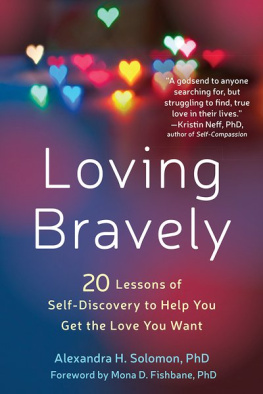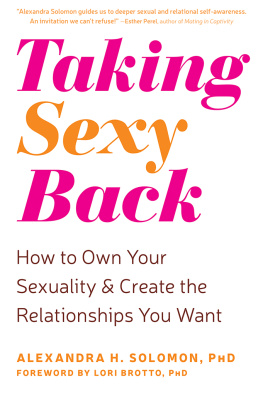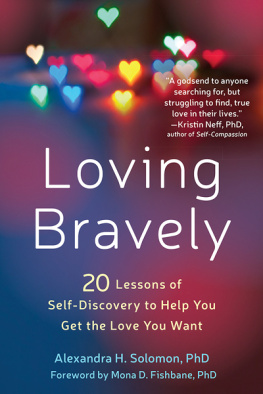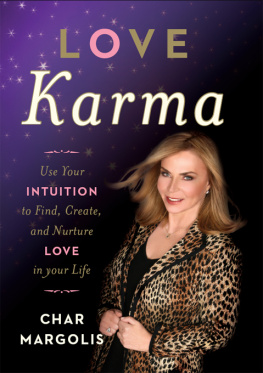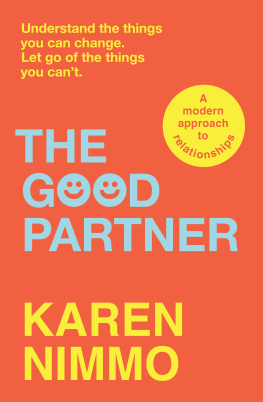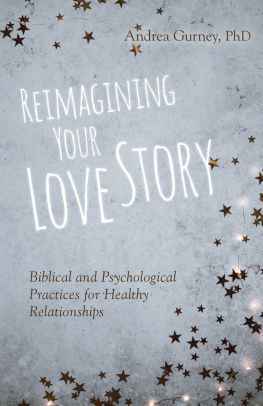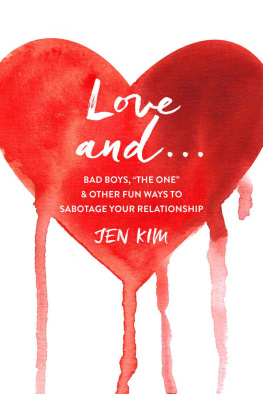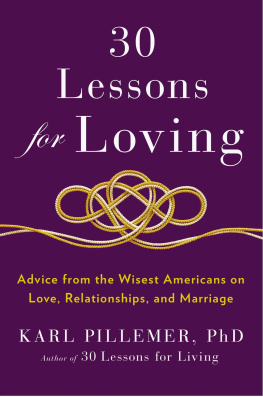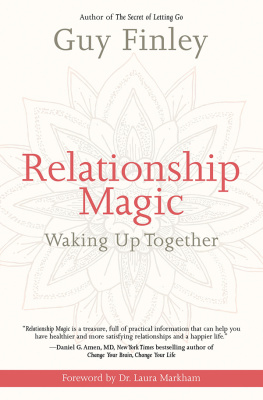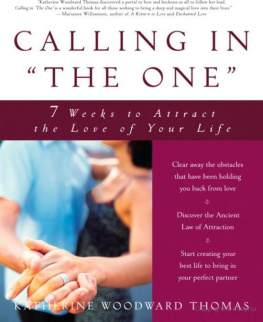This book is dedicated to my most loving teachers:
Todd who teaches me about trust
Brian who teaches me about faith
Courtney who teaches me about joy
You are my world
And there you are
standing by
giving me space
to draw you close
conjuring
feeling and knowing
into touch
whispers
and light
on a page written
to the beat
of the very
you
that got me
here
we will make history
anew
dear Love
mastering
ourselves
in the midst
of each other
Loving Bravely
(from Dear Love by Alexandra Folz)
Contents
Most of us love to be in lovebut often we dont know how to find love or how to sustain it. In this remarkable book, Alexandra Solomon addresses both issues as she takes us on a journey of discovery, exploring the wonders, challenges, and dilemmas of love. Loving Bravely empowers the reader to shift from how to find Mr. or Ms. Right to how to be Mr. or Ms. Right. Alexandra identifies the key skills for being a great lovernot just in bed but also throughout the day. To be a great lover you need to develop relational self-awarenessunderstanding what makes you tick. Alexandra encourages us to examine our stories about love, sex, gender, and commitment. As she notes, these stories we tell ourselves shape our reactions, often in ways that leave us unhappy. Taking ownership of our own stories opens up a space for us to write a more successful narrative. In my own book I also explore the idea that, rather than being a victim in your life, you can be an author of your life and your relationship. Alexandra Solomons book gives you a terrific roadmap for becoming the author of your own relational life.
Alexandra defines bravery as the courage to face yourself, to identify your vulnerabilities and ways of navigating in the relational world. To be brave in love is also to accept that love is messy and constantly evolving. Rather than thinking in black and white terms, she encourages us to embrace the gray areato see the circularity of our dances with our partner and to embrace the dialectics of love. The same person who loves and protects us can let us down at times; we are kind and considerate, but we can be selfish and reactive when we feel threatened. Accepting the both/and nature of life and of love is part of the wisdom that Alexandra offers us.
In my work with distressed couples, I help them develop skills of relational empowermentwhich includes emotion regulation, empathy, and generosity. Alexandra offers techniques that facilitate these skills. She suggests that we find a space between stimulus (when someone you love says things that upset you) and response (when you blow up at that person!). We dont have to react on automatic pilot, driven by our emotional brain. We can pause and ask, as Alexandra suggests, What would love do? We can respond with our higher brain, choosing a more mature response. Alexandra encourages us to examine how we show up for love. In her view, we are not just passive recipients of what our partner dishes out. We can make choices that allow us to be successful lovers in the broadest sense.
The opening metaphor Alexandra uses in her introduction is of a driver in a car. This metaphor reappears in the book: she asks us, Whos in the drivers seat of your life? We could say that this book is a kind of Drivers Ed manual for your relational life. She offers this manual not in a cookbook kind of waylove cant be reduced to a bunch of how-tos. And she doesnt offer her ideas in a holier-than-thou preachy way. Alexandra Solomon offers her wisdom about relationshipsand there is a lot of wisdom in this bookin an inviting, accessible, often funny way. In addition to referencing key ideas from psychology and relationship science, she shares vignettes from her clinical practice and from her own life. She is slogging through the same relational mud as the rest of usand she invites us along on her own journey in the relational realm.
Love is not a destination; it is a process. To be a great lover, you need to develop skills of emotional intelligence. Alexandra offers us practical tools to develop these skills, along with ways to step outside of our own narrow beliefs and assumptions. She encourages us to develop authorship and freedom in our love lives.
You are in for a treat as you read this book. Alexandras tone is witty, irreverent, and inviting. She understands the challenges of the current dating culture, as well as the ways we can get stuck in our own relational perspective based on our family history, culture, and gender training. In a delightful manner, Alexandra challenges us to name our assumptions and to grow so we can cultivate a more successful narrative. She encourages us to love ourselves so we can love another, and to bring self-compassion to our vulnerabilities. Go on the journey with heryou will come out wiser on the other side, with great tools to become the hero or heroine of your own love story.
Mona DeKoven Fishbane, PhD
Author, Loving with the Brain in Mind: Neurobiology and Couple Therapy
Director, Couple Therapy Training, Chicago Center for Family Health
The Love Classroom
If he desired to know about automobiles, he would, without question, study diligently about automobiles. If his wife desired to be a gourmet cook, shed certainly study the art of cooking, perhaps even attending a cooking class. Yet, it never seems as obvious to him that if he wants to live in love, he must spend at least as much time as the auto mechanic or the gourmet in studying love.
Leo Buscaglia
I remember the day I took my driving test at sixteen, sitting nervously at the DMV, frantically reviewing street signs in my head. Id been preparing for more than a year. And while I had some trepidation about being trusted with this huge responsibility, I felt ready. Dammit, I had read the manual over and over and logged lots of practice time behind the wheel! When I plunged headfirst into a relationship with my husband, however, I had no such preparation. I didnt study for months about how to make a relationship last before leaning in for that first kiss. I didnt worry about the safety of my heart or his until years later when I already felt deeply invested. Why didnt I put the same due diligence into learning how to do love as I did into learning how to drive?
We assume that people ought to just know how to do love. And that is a huge problem. Its the very problem I have been addressing for almost twenty years in my therapy office, in my graduate teaching, and in an undergraduate course I teach at Northwestern University called Building Loving and Lasting Relationships: Marriage 101. As you might imagine, this course is very popular and has received lots of media attention over the years because it is unique, which unfortunately reflects the fact that we have yet to figure out how to really value relationship education. Over the years, many people have told me that they wished they had had the chance to take a class like Marriage 101 before committing to an intimate relationship.
Whats worse is that those who are wise enough to seek a better understanding of themselves often end up feeling ashamed of themselves for doing so. I see this over and over in my clinical work. When an engaged couple comes to see me for premarital therapy, more often than not they begin our first session by making a self-conscious statement such as, I cant believe we are doing couples therapy before we have even walked down the aisle. I quickly jump in and say that I wish all couples were so thoughtful and brave.
As a culture, we are obsessed with the idea of loveconsider the $40 billion wedding industry and the entire genre of romance-based reality television. However, we are not nearly so obsessed with
Next page
